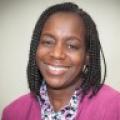Dallas clergy, reeling from the shootings of police in their city and the recent shootings of black men by police elsewhere, say they will start responding with prayer and then move to advocating for concrete societal changes in the aftermath of the tragedies.
“Faith leaders now have a responsibility to say we’re going to pray with our feet until real structural change happens in this country,” said the Rev. Frederick Haynes, pastor of Friendship-West Baptist Church in Dallas.
Haynes, who leads a predominantly black megachurch, joined thousands at a midday prayer service in the city’s Thanks-Giving Square July 8.
But he said he realizes such gatherings are not sufficient in the eyes of young people who have been calling for change. Their peaceful protests of the recent deaths of black men in St. Paul, Minn., and Baton Rogue, La., at the hands of police came just before the violent attacks in Dallas that left five police officers dead.
On July 10, Haynes plans to host a “community conversation” led by the young protesters to discuss advocacy for changes to “redo policing,” including reviews of hiring practices and mental health care for law enforcement.
“Policing in America of black and brown communities is the front lines of a war that we feel that is undeclared on black and brown bodies that take place every day in this country,” Haynes said.
The Rev. George Mason, pastor of Wilshire Baptist Church, a mostly white congregation, joined Haynes at the community prayer service and in an op-ed in The Dallas Morning News urging solidarity “because every act of coming together is another stitch in the torn fabric of our community.”
Mason said members of the interracial and interreligious networks that already exist in Dallas have started to determine the next steps for their work in light of the tragedies — but he said transformation is needed not only in local communities but across the nation.
“We know we have a problem that needs to be addressed but we don’t have a problem with all black people or all white people or all law enforcement people,” he said. “We have a problem of how to address a continuing lingering problem of racial prejudice and profiling that comes out in moments of extraordinary stress and pressure and then how to respond better in the wake of it.”
Other Dallas religious leaders are also calling for moving beyond prayer to greater action to foster unity.
“One of the real tragedies today is that the church as a whole has failed to advance God’s kingdom light, equity, love and principles in our land in order to be a positive influence and impact for good in the midst of darkness, fear and hate,” said Oak Cliff Bible Fellowship Pastor Tony Evans. “We must do better.”
Got something to say about what you're reading? We value your feedback!

